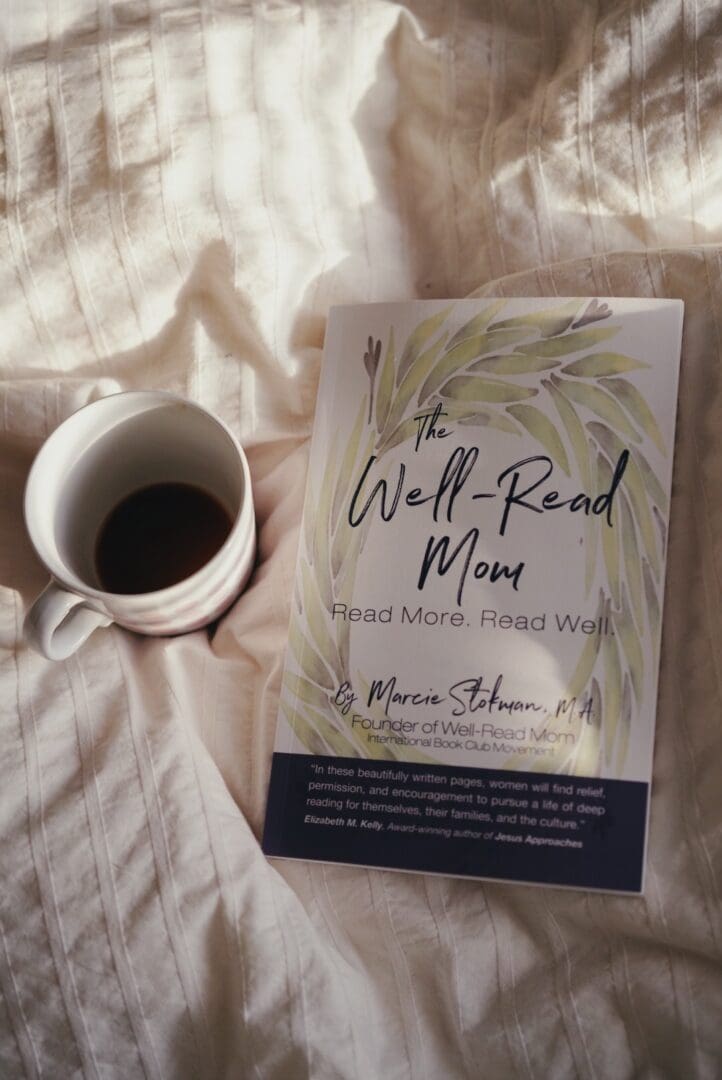Forming the Moral Imagination
A battle is raging in our culture and at its heart is the education of the imagination.
We are together in Well-Read Mom to awaken our moral imagination to a greater truth of reality. This awakening, we believe, can benefit our lives and the lives of our families as well as impact the broader culture.
What is the imagination and how can a well-formed imagination help us? The imagination is what allows us to perceive more than what is immediately before our eyes. We ponder the universe. We live with a sense of wonder. We have a remarkable capacity to use our imagination, but here’s the catch: this capacity needs to be developed.
To gain access to the imaginative world, the untrained mind needs some essential elements. These come from books, stories, reading! Scrolling and clicking through a flickering stream of images and videos robs us of these elements. When it comes to developing the imagination, screens stifle while books fuel. Mitchell Kalpakgian writes, “Movies with all their technical effects may stir the passions and move the emotions, but they do not develop the imaginative capacity because the images are already given.”
The first step to developing our imagination necessitates reading more.
Read more. If we read daily from books, deep reading becomes habitual. Maryanne Wolf, director of the Center for Reading and Language Research at Tufts University, describes the experience of deep reading as entering “a cognitive space in the brain where connections are woven together between the visual, language and conceptual areas of the brain.” When a person enters this realm of the mind, she can analyze, draw on personal experience, imagine, and think new thoughts of her own. This is the place where images are generated. Wolf fears that this process will never occur if “we’re just given too much stimulation.”
The second step, to developing it well, involves a commitment to reading well.
Read well. What we read matters! Worthy books shape our imaginative view of the world. This is the story we carry around in our minds about how life works. This story ought to be oriented to what is true, “to the apprehending of right order in the soul and right order in the commonwealth,” as Russel Kirk says. If not, a perverse kind of imagination can take its place. Kirk called this a diabolical imagination. Sadly, this perverse imagination dominates in many of the books and movies in our culture.
How is the moral imagination formed? Scripture and the liturgy are crucial. This is where we grow in a vision that sees a created order in the world, an order both to the seasons and to relationships. Most importantly, through the Christian story, the meaning of life is brought into focus. In this story, each person has infinite value. There are mystery and meaning in suffering. All circumstances have meaning, from my mom’s dementia to trying to find mismatched socks. Individual experiences transcend into this great story where there is a mysterious connection between the visible and invisible worlds.
While the primary place for the education of the imagination is through the liturgy, the arts, especially literature, can help reinforce a moral imagination.

When Margaret was six, she wanted to get in on the intense basketball game going on in our driveway. So, she took charge and commanded her brothers, “Mom says you have to let me play or you’ll be in trouble.”
Johnny came running into the kitchen where I was making dinner, “Mom, do we have to let Margaret play? She said you said we had to let her in. We’re in the middle of a really good game!”
“No, you guys keep playing. I didn’t tell Margaret that.”
When the scenario happened again, Philip challenged me, “Mom, Margaret is lying; you should do something about this!”
Sigh! Discipline is never convenient. Taking her by the hand, I led little Marg to the couch, pulled William Bennett’s Book of Virtues from the shelf and paged to the story of “The Boy Who Cried, Wolf.” Without nagging or scolding her because lying is wrong, I read. She listened. The Imagination was brought into play. Margaret began to get a glimmer of insight. The boy cried wolf because he wanted attention; he wanted to belong. She lied because she wanted attention; she wanted to belong.
Without commanding or coercing, I helped Margaret to see how lying was not getting her what she wanted. Her mind and heart were engaged. C.S. Lewis argued that while reason is the natural organ of truth, “imagination is the organ of meaning.”
As a society, we care that children read, but as adults reading good literature is often sidelined.
“Oh, reading is nice if you have time but who has time? I’ll live fine without it.” In Well-Read Mom we beg to differ. Reading is not an extra; it is essential. Robert Houston Smith writes, “When functioning as it should… imagination is the most important means by which higher truths can be communicated.” Conscience speaks to conscience through great literature.
In this secular age, we need all the help we can get to awaken our imagination in a way that helps us move toward the truly beautiful good. Worthy books fill our imaginations with possibilities for facing life with faith, hope, love, gratitude, courage, fortitude, temperance, moderation, justice, and mercy.
Marcie Stokman is the founder and president of the international movement and book club the Well-Read Mom (WRM). With a passion for reading and motherhood, she writes and speaks to encourage women in a world of rising isolation, loneliness, and mental health issues. Through the power of reading together and reading well, Well-Read Moms across the country are finding friendships, meaning, and true leisure. Connecting on a deeper level and serving others in their search for purpose is Marcie’s passion.
*This blog post was adapted (with permission) from Marcie Stokman’s book: The Well-Read Mom. © 2019 by Marcie Stokman All rights reserved. For more information about Marcie’s book, click here.
For more information about Well-Read Mom, click here.

